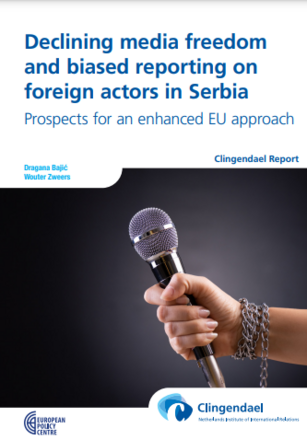
For years, the European Commission’s progress report on the accession negotiations of Serbia have indicated a steady decline in the level of freedom of expression in the country. The European Commission’s findings have also been confirmed by a number of independent international reports that have warned about an ongoing decline in the working conditions of journalists and media professionals. Growing political interference, poor financial sustainability, obscure media ownership and increasing cases of threats, attacks and intimidation against journalists are listed as the main causes for the poor situation of the Serbian media sector.
The analysis discusses how the worsening conditions of press freedom impact media reporting on foreign actors in Serbia. It focuses on three key foreign actors - i.e. Russia, the US and the EU - to show how politically-controlled media tend to amplify foreign policy biases promoted by the government, thus exposing citizens to partial, unbalances and often inaccurate information.
As part of its path towards EU accession, Serbia must align to EU standards in relation to freedom of expression. As the EU EU does not have an exclusive competence in the media sector, its approach towards candidate countries has mostly been limited and fragmented. Stressing the key importance of media freedom, independence, and pluralism for European democracies, the authors argue that the EU should adopt a more adequate and coherent strategy for tackling press-related issues in candidate countries, making media freedom a priority of the enlargement process and enhancing the political pressure on Serbian political elites to engage in a credible reform process.
Tags: Serbia Media freedom Political pressureThe content of this article can be used according to the terms of Creative Commons: Attribution-NonCommercial 4.0 International (CC BY-NC 4.0) . To do so use the the wording "this article was originally published on the Resource Centre on Media Freedom in Europe" including a direct active link to the original article page.

